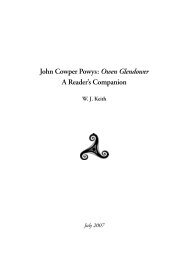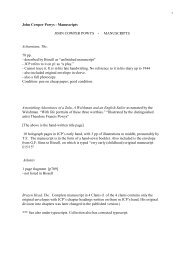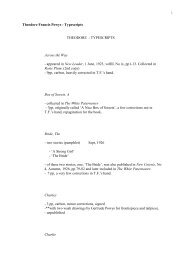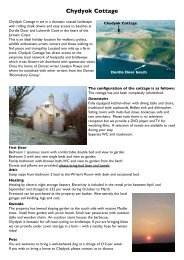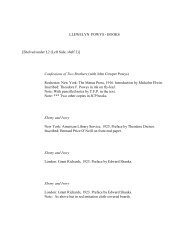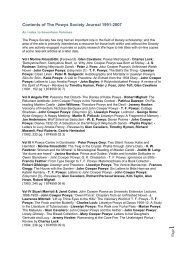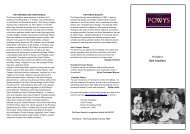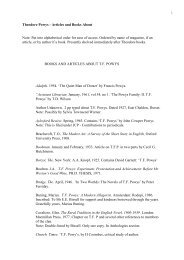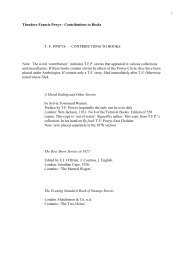J. C. Powys' Autobiography: A Reader's Companion - Site POWYS
J. C. Powys' Autobiography: A Reader's Companion - Site POWYS
J. C. Powys' Autobiography: A Reader's Companion - Site POWYS
You also want an ePaper? Increase the reach of your titles
YUMPU automatically turns print PDFs into web optimized ePapers that Google loves.
8 <strong>Autobiography</strong><br />
society, told with wit and a satiric undertone.<br />
Sense and Sensibility appeared in 1811.<br />
author of a first-rate book [on Dreiser]<br />
(553) — Either Burton Rascoe’s Theodore Dreiser<br />
(1925) or Dorothy Dudley’s Forgotten Frontiers:<br />
Dreiser and the Land of the Free (1932), the only<br />
substantial studies of Dreiser by the time JCP<br />
wrote. Since Rascoe is the author of two<br />
journalistic pieces about JCP and Llewelyn, one<br />
from 1921 (see Powys Society Newsletter 44<br />
[November 2001] 21), the other from 1926 (see<br />
Powys Society Newsletter 28 [April 2003], 22–24),<br />
he is the more likely candidate.<br />
“Avanc” (330) — A crocodile-like lake-dwelling<br />
monster, still known in Welsh mythology as<br />
“Afanc” in stories of Hu Gadarn and in “Peredur<br />
Son of Efrawg.” It is referred to frequently in<br />
Porius. Traditions regarding avancs in England are<br />
extremely rare.<br />
Aytoun (25–6, 38, 146, 161, 336) — William E.<br />
Aytoun (1813–1865), a Scots writer of ballad<br />
romances, considerably influenced by Scott and<br />
Macaulay. See J[ohn] B[atten]’s 2001 article.<br />
Aztec (400) — The Aztecs were an Amerindian<br />
people of central Mexico who succeeded the<br />
Incas and the Mayan peoples and were ultimately<br />
conquered by the Spanish in the early sixteenth<br />
century.<br />
B<br />
Baal (467) — A heathen god worshipped in the<br />
“high places” in biblical times and regularly<br />
condemned by Hebrew prophets.<br />
Babylon (31) — Ancient kingdom in the Middle<br />
East, which defeated the Israelites and carried<br />
them into exile. The “psalmist” reference is<br />
doubtless to Psalm 137. So, “Babylonian” (171).<br />
Babylon Hill (125) — West of Sherborne, close to<br />
Yeovil. Also mentioned in Wolf Solent (99, etc.);<br />
“what would [JCP and Littleton] feel today to find<br />
that deep, romantic cutting totally gone and a<br />
very wide carriageway in its place?” (Gourlay [8]).<br />
Bacbuc, Princess (62) — A character in Rabelais<br />
(Book 5, chs.42–6).<br />
Bacchanal (431) — An occasion of drunken<br />
revelry in honour of Bacchus, the Roman<br />
equivalent of Dionysus (q.v.).<br />
Backwater (151) — Weymouth Backwater, also<br />
mentioned in Weymouth Sands (91), see Peltier<br />
(internet). Llewelyn writes about it eloquently in<br />
“Childhood Memories” (Earth Memories [48–50]).<br />
“Baconian Theory” (255) — The belief that the<br />
plays ascribed to Shakespeare were in fact the<br />
work of Francis Bacon, Lord Verulam (1561–1626).<br />
JCP writes sensibly about the weaknesses of the<br />
theory in the chapter on Shakespeare in The<br />
Pleasures of Literature.<br />
Baedeker (391) — The famous series of German<br />
guidebooks popular in the late nineteenth and<br />
early twentieth centuries.<br />
Balin’s fatal spear (417) — The spear that wounds<br />
the Fisher King in some Grail romances.<br />
Balius (388) — See “Zanthus.”<br />
Balm of Gilead (369) — See Jeremiah 8:22. Gilead<br />
is a region in modern Jordan. Also quoted in<br />
Visions and Revisions (193) and Rabelais (219).<br />
“balone” (567) — A misprint for “baloney,” slang<br />
for “nonsense.”<br />
Balzac (293, 418, 544, 581) — Honoré de Balzac<br />
(1799–1850), French novelist whose novels and<br />
short stories form a vast saga known as la<br />
Comédie humaine. JCP wrote an essay on Balzac<br />
in Suspended Judgments. So, “Balzacian” (198,<br />
472, 486).<br />
Banquet (120) — An alternative translation of<br />
Plato’s dialogue known more often in English as<br />
the Symposium.<br />
Baphomet (467, 473) — Believed to be a<br />
corruption of Mahomet, and an idol that the<br />
Knights Templar were accused of worshipping.<br />
One of the names used by Aleister Crowley.<br />
However, Hugh Schonfield (164) has recently<br />
argued that it is a code-word for “Sophia”<br />
(Wisdom). Might also be the corruption of an<br />
Arabic word meaning “father” (or “source”) of<br />
understanding.<br />
barge of Cleopatra (411) — See Enobarbus’s<br />
famous description in Shakespeare’s Antony and<br />
Cleopatra (II ii 194–222).<br />
Barmouth (187) — A small town in the county of<br />
Gwynedd in Wales.<br />
Barnes, William (54, 224) — Dorset dialect-poet,<br />
scholar, clergyman, and friend of Thomas Hardy<br />
(1800–1886). See Hardy’s account in his obituary<br />
article reprinted in Millgate, ed., Hardy’s Public<br />
Voice (94).<br />
“Barnum and Bailey” (540) — Well-known circus<br />
proprietors.<br />
Barrès, Maurice (420, 429) — French author and<br />
politician (1862–1923), “Frenchman of<br />
Frenchmen” (Visions and Revisions [63]). Sacred<br />
Hill must refer to La Colline inspirée (1913), the<br />
hill in question being Sion-Vaudémont in<br />
Lorraine; this book has not, I think, been<br />
translated into English. The reference at 429 is to<br />
Greco, ou le secret de Tolède (1923).<br />
Baskerville (245, 260) — John Baskerville (1706-<br />
1775) was a typographer who gave his name to a<br />
much-used style of type.<br />
Baths of Caracalla (402) — Famous Roman baths<br />
in Rome.<br />
Bathshebas (218) — A somewhat odd reference in



